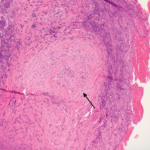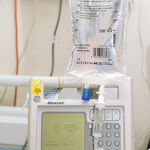Wegener’s granulomatosis (WG) is a rare and complex blood-vessel disease affecting men and women equally. Although the cause of the disease is unknown, it can be treated and managed effectively.
According to the fact sheet by Carol A. Langford, MD, MHS, director of the Center for Vasculitis Care and Research at the Cleveland Clinic, “Most commonly, WG affects the nasal sinuses, lungs, and kidneys, but can also affect the eyes, ears, skin, nerves, joints, and other organs. Because of the variety of potential organ involvement, a wide range of symptoms can develop over days to months. For 90% of people, the first symptoms appear in the respiratory tract (e.g., nose and lungs) and include nasal congestion, frequent nosebleeds, shortness of breath, and cough that may produce bloody phlegm. Other early symptoms can include joint pain, decreased hearing, skin rashes, eye redness and/or vision changes, fatigue, fever, appetite and weight loss, night sweats, and numbness or loss of movement in the fingers, toes, or limbs.
Well-studied therapies have proven effective in treating WG. Although permanent organ damage can still occur, the medications used to treat WG can improve or even resolve organ injury in many instances.
The fact sheet also notes that, “the impact of WG varies greatly between individuals. It’s influenced by the severity of their illness, the organs involved, and any complications related to the disease or its treatment.” People with WG need ongoing checkups that include laboratory studies, imaging tests, and clinic visits with their doctor. Such monitoring is essential to follow the course of WG and to detect or prevent short- or long-term treatment-related complications.
Even with effective treatment, relapses are common. Relapses may resemble or differ from the initial onset, so new symptoms should be reported to the medical practitioner as soon as possible. Regular doctor visits together with laboratory tests and imaging studies can help detect relapses early.
For more details on diagnosing, treating, and living with WG, or to download this and other ACR patient-education fact sheets, visit www.rheumatology.org and follow the links to patient education from the Practice Support menu.

